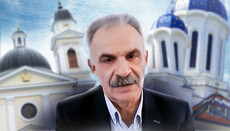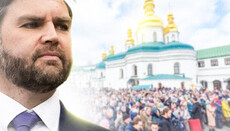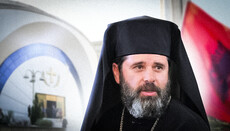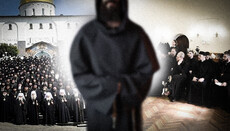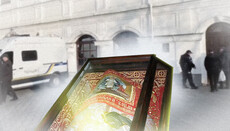Again Tomos did not help: why "Montenegrin Poroshenko" lost the election
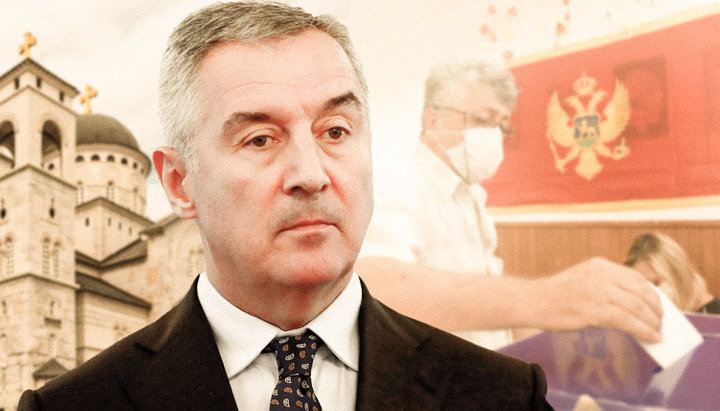
The President of Montenegro, who declared war on the canonical Church, lost the election and virtually lost power. A year ago, the same thing happened to Poroshenko.
At the end of December 2019, the Montenegrin parliament passed an anti-church law, according to which the canonical Metropolitanate of Montenegro and the Littoral of the Serbian Orthodox Church (SOC) lost its property and was in fact outlawed. Its place was to be taken by the schismatic Montenegrin Orthodox Church (MOC). On the eve of the vote on this bill, the Montenegrin authorities conducted a real special operation: those members of the Skupština Crne Gore (the Parliament of Montenegro) who were against the anti-church bill were detained by the police and could not take part in the vote. But the rest voted unanimously, and the law was passed. At the same time, the deputies of the Skupština rejected 117 (!) amendments to the bill.
The Montenegrin anti-church law provides for the transfer from the SOC to the state (read, schismatic MOC) of virtually all church property, including churches, monasteries, etc., which were built or transferred by the state to the Church before December 1, 1918. Thus, more than 600 churches and monasteries must be confiscated from the SOC and Orthodox communities must either become schismatics or end up on the street.
Path to the "Montenegrin Tomos"
The anti-church campaign in Montenegro entered its active phase in the summer of 2019 when Montenegrin President Milo Đukanović said that the SOC was something like the tentacles of the "Serbian world", that it was working for a foreign country and undermining Montenegro's independence. It was a total rip-off of the statements of the former President of Ukraine P. Poroshenko.
And just like the former Ukrainian leader, M. Đukanović said he would seek autocephaly from the Phanar for Montenegrin schismatics. He was reassured in this regard by the interview of the former Exarch of Constantinople in Ukraine, Archbishop Daniel of Pamphylia (Zelinsky), with the BBC on January 11, 2019. "I support the thesis that every nation wishing to have its own Orthodox Church should have the right to establish it and ask for its recognition by other Orthodox Churches, including in the case of Macedonia and Montenegro," the former exarch said at the time. And although Patriarch Bartholomew stated that he did not plan to give the Tomos to the MOC, after his intervention in church affairs in Ukraine, everyone understands perfectly well how what such statements of "His All-Holiness" are worth. What Patriarch Bartholomew does not plan today, he can realize tomorrow, and, as they say, in the blink of an eye. In fact, these words are confirmed by the leader of the Montenegrin schismatics, Miraš Dedeić, who in January 2020 stated that his structure would soon receive its Tomos.
Montenegrins defend their Church
Even before the anti-church law in Montenegro was passed, mass protests swept across the country. Hundreds of thousands of people took to the streets, and special committees for the protection of shrines were set up at each temple of the Serbian Orthodox Church. Petitions in defense of the Metropolitanate of Montenegro and the Littoral of the Serbian Orthodox Church were signed by 2,500 teachers and 300 lawyers of Montenegro, as well as more than a hundred officers and servicemen.
Protests against the persecution of the SOC continued almost constantly until the introduction of quarantine due to the coronavirus. Twice a week, Montenegrins gathered in large numbers for religious processions in defence of their Church. These gatherings differed from all other protests in all other countries in two respects.
First, they were unprecedentedly massive. In some days, up to 300,000 people took to the streets in all cities of Montenegro to defend the SOC, which is almost half of the entire population of Montenegro. And secondly, no political force organized, coordinated, joined these protests and, accordingly, did not receive any political dividends from them. The protests were peaceful, they took place exclusively in defence of the canonical SOC, and the people who took part in them did so were exclusively heart-led.
His Beatitude Onuphry and the hierarchs of the Ukrainian Orthodox Church, who visited Montenegro in February 2020, could see it for themselves.
After the introduction of quarantine, the SOC complied with the demands of the authorities and stopped mass rallies, but as soon as the quarantine was weakened, the protests resumed, this time with the necessary anti-epidemiological measures. However, despite the SOC observing these measures, the Montenegrin authorities arrested Bishop Joanikije of Budimlje-Niksic and several SOC priests on May 13. A total of 67 supporters of the SOC were administratively punished under the pretext of allegedly violating quarantine regulations, and criminal cases were instituted against 11 people, including Metropolitan Amfilohije (Radović) of Montenegro and the Littoral.
But these persecutions only intensified people’s protests against the authorities' anti-church policies. The Montenegrin government and the SOC have tried several times to negotiate the repeal of the anti-church law, but no results were reached, despite calls from the European Union. These appeals, to tell the truth, were not at all impartial. European Commission spokeswoman Ana Pizonero gave a clear preference to the Montenegrin authorities: “We welcome the government's efforts to find a compromise. Unfortunately, no solution was found in these talks. We call on both sides to continue the dialogue," she said in June 2020. As can be seen, she сommended only the Montenegrin government.
Due to the stubborn reluctance of the Montenegrin authorities to repeal the anti-church law, which violates the rights of SOC believers, the episcopate of the Metropolitanate of Montenegro and the Littoral was forced to state that the current Montenegrin authorities discredited themselves with their anti-church policy and can no longer enjoy the people's trust. On the eve of the parliamentary elections, which took place on August 30, Metropolitan Amfilohije (Radović) of Montenegro and the Littoral recorded a video address and called on all citizens to go to the polls to vote "in defence of God's shrines".
"In my 82nd year of life, for the first time now I will go to the parliamentary elections – on August 30 – and I call on all Montenegrins, residents of Montenegro and everyone else to vote in defence of God's shrines, which are now under attack in Montenegro by those who do not know what a shrine is. God willing, that this defence will win for the sake of the future of all Montenegrins. All come to vote in defence of the shrines!” said Metropolitan Amfilohije.
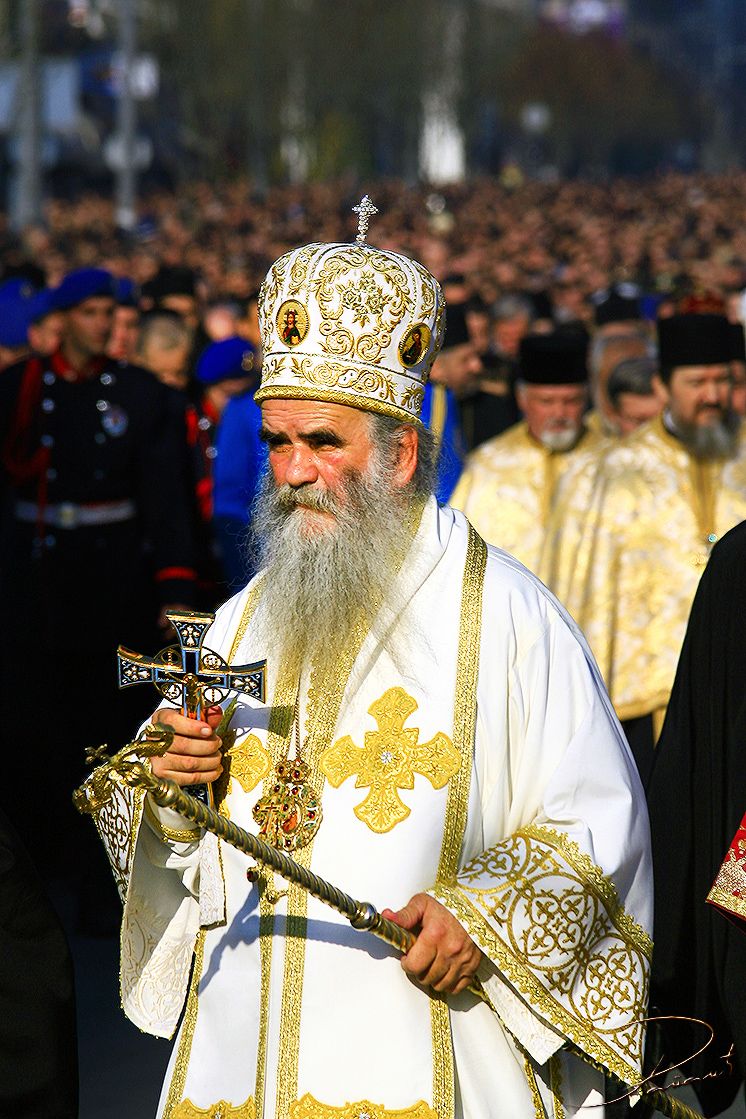
Commenting on the position of the Church on the issue of parliamentary elections, Bishop Amfilohije said: “The Church does not have its own party or its own electoral list. The Church does not support any party and therefore leaves the political process to politicians."
Nevertheless, the Church can give a moral assessment of the actions of the authorities, especially if they are so clearly directed against Her. The Church can draw the attention of voters to those actions of the authorities which it considers inadmissible and urge citizens to make appropriate choices. "On the other hand, citizens can be encouraged to approach the upcoming elections using their political rights. As the unconstitutional law violates the religious rights and freedoms of Christians and the Church, and as all our prayers and requests for harmonization of our minimum requirements are rejected, we as full citizens of this state consider it legitimate to urge the faithful not to vote for politicians promoting anti-church laws," Metropolitan Amfilohije stated.
Failure of the persecutor of the Church
Now the elections in Montenegro have passed. They showed the worst result for the ruling Democratic Party of Socialists of Montenegro (DPSM), whose real leader is President Milo Đukanović. The DPSM won 35.06% of the vote, which even in a coalition with parties close to it – the Social Democrats of Montenegro, the Bosniak Party and the Albanian List – allows it to take only 37 seats in the Skupština out of 81. Opposition political forces "For the Future of Montenegro", "Peace is our Nation", "United Reform Action" and the Social Democratic Party, won 43 seats in the election, gaining a total of 53.75%.
Leaders of the political forces "For the Future of Montenegro", "Peace is our Nation" and "United Reformist Action" have already declared their readiness to create a ruling coalition and form the government. The Social Democratic Party is still thinking, but even without its two mandates, the current opposition forces have a majority in the parliament. Such results allowed the leader of the opposition coalition "For the Future of Montenegro" Zdravko Krivokapić to declare victory in the elections. "Citizens of Montenegro, thank you for your support! The 30-year regime has fallen,” he said, speaking on national television.
And the first decision of the new ruling coalition in case of its formation, he called the abolition of the anti-church law: "The first step, of course, will be the repeal of the Law on Freedom of Religion, followed by the adoption of the Law on Lustration and the Law on Origin of Property, which will determine the attitude towards those who have driven Montenegro to hopelessness, achieved untold riches and made the rest of the citizens of Montenegro poor. It will be fair, just and a warning to all who go into politics that politics is not the most profitable job."
Of course, the elections in Montenegro and their results do not mean that the government in this country will change. You can challenge the results of the vote, you can lure individual deputies, buy them or just intimidate, you can arrange a Maidan, organize new elections and so on. There are a lot of ways to try not to give up power if you really don't want to. But the fact remains forever: the political force that has ruled Montenegro for almost 30 years has lost the trust of voters precisely because of its anti-church policies. And the representatives of the camps that are directly opposite agree on this.
For example, Konstantin Kosachev, Chairman of the Federation Council Committee for Foreign Affairs, said: "The Church, although separated from the state, played a very important role in this election battle.” Also, the Ukrainian pro-Western publication ‘Zekalo Nedeli’ (‘Mirror of the Week’ – Trans.) published an analytical article, in which the position of the Church was said to be the main reason for the defeat of the ruling party of Montenegro: "The Law on Freedom of Religion pushed away from the pro-government candidates a lot of voters who chose the Church in the ‘party vs church’ dilemma.”
***
Metropolitan Amfilohije spoke about the global causes of the current defeat of the ruling party of Montenegro in the elections back in July 2020. The key one is the enmity towards God and his Church. "Those who are now in power in Montenegro should also understand that they have declared war on God, not on Amfilohije or the people of Montenegro. They declared war on the living God, and so he who fights God, loses his image and soul, renounces all the true rulers who ruled this land from the time of Emperor Constantine to the time of King Nicholas Petrović," said Metropolitan Amfilohije.
And in this context, we cannot but draw a parallel with the Ukrainian events. Petro Poroshenko, having organized a new "church" of two schismatic structures and organized persecution of the UOC, just as Milo Đukanović "declared war on the living God". Poroshenko suffered a political fiasco. Đukanović also lost.
The parliamentary elections in Montenegro in 2020 in the same way as the presidential and parliamentary elections in Ukraine in 2019 clearly proved that the hostility against the Church leads to the fact that common people turn away from such politicians and refuse to support them in the elections. As a result, they lose their power. But the enmity against the Church leads not only to a defeat in elections and loss of power but to much more terrible consequences: a defeat in the fight for their immortal soul and a loss of hope for salvation.
